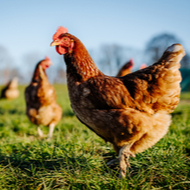Novel vaccine offers hope in fight against avian flu

The vaccine reduces the level of avian flu virus chickens shed into the environment.
A novel vaccine for avian influenza that produces a faster and stronger immune response in chickens compared to current vaccines has been developed by The Pirbright Institute.
The vaccine, reported in the journal npj Vaccines, protects chickens against signs of the H9N2 avian flu strain and reduces the level of virus they shed into the environment. Researchers note an antibody response in chickens as early as six days after they had received the vaccination.
Avian flu vaccines are traditionally produced in chicken eggs. But in this study, researchers made the vaccine in laboratory cultures of insect cells – a technique that makes it easier and less expensive to produce.
The vaccine works by tagging flu virus proteins with a marker that makes it easier for immune cells, known as Antigen Presenting Cells (APCs), to efficiently capture and process the tagged proteins for triggering an immune response.
The team specifically tagged the influenza virus haemagglutinin protein (HA) and directed it to target CD83, a protein on the chicken APCs, demonstrating for the first time that this can be used as an effective vaccine.
“By targeting HA to chicken immune cells, we have generated a powerful addition to the armoury of poultry vaccines,” explained Professor Munir Iqbal, head of Pirbright’s avian influenza virus group. “Our improved vaccine could help prevent the spread of flu amongst vaccinated birds, which is essential for protecting poultry welfare, increasing food production, and reducing the risk of avian influenza spreading to humans.”
As the vaccine does not contain any live flu virus, it is also safer. Researchers say that no specialist high containment facilities are needed for its manufacture – a quality that makes it very attractive for large-scale manufacture.
Work is now underway to assess the vaccine’s potential for commercial production and use in the field.



 HMRC has invited feedback to its communications regarding the employment status of locum vets and vet nurses.
HMRC has invited feedback to its communications regarding the employment status of locum vets and vet nurses.